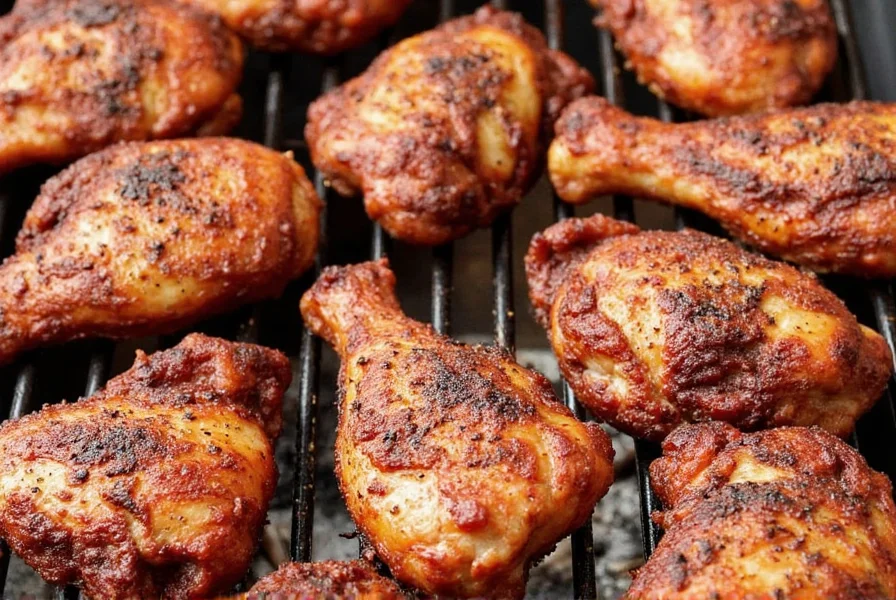Creating the perfect chicken rub is simple, quick, and transforms ordinary chicken into a flavor-packed masterpiece. Follow this step-by-step guide to make your own delicious blend at home with common ingredients.
Table of Contents
- What Exactly Is a Chicken Rub?
- Why a Chicken Rub Matters for Flavor
- Top Ingredients in Classic Chicken Rubs
- How to Make the Perfect Chicken Rub at Home
- Pro Tips for Applying Your Rub Like a Pro
- Store-Bought vs. Homemade Rubs: Which One Wins?
- Chicken Rub Buying Guide: What to Look For
- Creative Chicken Rub Ideas to Try Today
- Pairing Chicken Rubs with Sides & Sauces
- Frequently Asked Questions About Chicken Rubs
- Final Thoughts: Unlock the Magic of Chicken Rubs
What Exactly Is a Chicken Rub?
A chicken rub is a dry blend of herbs, spices, salt, and sometimes sugar used to season chicken before cooking. Unlike marinades, rubs create a flavorful crust that locks in moisture while enhancing texture and taste. This method is especially effective for grilling, smoking, and roasting.
Why a Chicken Rub Matters for Flavor
The magic of a great chicken rub is its ability to transform a bland bird into a flavor-packed star of the plate. Here's why rubs matter:
- Flavor Intensity: A good rub adds depth and complexity without masking the natural taste of chicken.
- Texture Enhancement: The right balance of coarse and fine ingredients creates a satisfying crust.
- Mouthfeel & Juiciness: Salt in the rub helps retain moisture, keeping the meat juicy.
- Versatility: Ribs, wings, thighs — you name it. A versatile rub works across cuts and cooking methods.
Top Ingredients in Classic Chicken Rubs
| Ingredient | Type | Role | Popular Examples |
|---|---|---|---|
| Salt | Base | Moisture retention & flavor enhancement | Kosher salt, sea salt |
| Sugar | Base | Browning & sweetness balance | Brown sugar, white sugar, coconut sugar |
| Paprika | Flavor base | Color & subtle smokiness | Sweet, smoked, Hungarian |
| Garlic Powder | Aroma booster | Umami-rich background note | Minced garlic, garlic powder |
| Onion Powder | Aroma booster | Savory layer | Granulated onion, shallot powder |
| Cayenne Pepper | Heat source | Spice kick | Chili powder, crushed red pepper |
| Dried Herbs | Complexity enhancer | Earthy or floral notes | Oregano, thyme, rosemary |
How to Make the Perfect Chicken Rub at Home
Creating your own chicken rub is easier than you think and gives you full control over flavor profiles. Here's a step-by-step guide to making your own blend:
- Gather your ingredients: Choose a base (salt/sugar), add aromatics (garlic/onion), pick a heat source (cayenne/chili), and toss in some herbs for depth.
- Balance the flavors: Aim for a ratio like 4:3:2:1 (base:aromatics:heat:herbs). Adjust to taste as you go.
- Mix thoroughly: Use a small bowl to combine everything evenly. Break up any clumps for consistent application.
- Store properly: Keep your homemade rub in an airtight container away from light and moisture for best shelf life.
Here's a basic recipe to get you started:
Classic Smoky Chicken Rub
- 2 tbsp smoked paprika
- 1 tbsp brown sugar
- 1 tbsp kosher salt
- 1 tsp garlic powder
- 1 tsp onion powder
- ½ tsp cayenne pepper
- ½ tsp ground cumin
- ½ tsp dried thyme
Pro Tips for Applying Your Rub Like a Pro
You've made your rub — now what? Proper application is key to achieving that perfect flavor profile. Here's how to do it right:
- Dry the chicken first: Pat your chicken dry with paper towels. Moisture interferes with adhesion and browning.
- Use your hands: Don't be shy! Rubbing by hand ensures even coverage and better absorption.
- Don't be afraid of quantity: You want a thin, visible layer — enough to see but not overwhelm the skin.
- Let it rest: Allow the chicken to sit with the rub for at least 30 minutes (or up to 24 hours in the fridge) for deeper flavor penetration.
- Seal in flavor: After applying, wrap tightly and refrigerate if marinating overnight.

Store-Bought vs. Homemade Rubs: Which One Wins?
Both options have their place in the kitchen. Let's compare them side by side:
| Feature | Store-Bought Rub | Homemade Rub |
|---|---|---|
| Convenience | ✅ Quick & easy | ⚠️ Requires prep time |
| Customization | ❌ Limited control over ingredients | ✅ Full control over flavor profile |
| Cost | 💰 Can be pricey per ounce | 💸 Cheaper long-term investment |
| Freshness | ⏳ May lose potency over time | 🔥 Freshest flavor when used shortly after mixing |
| Health | 🚫 Often contains preservatives & fillers | ✅ Clean ingredients, no additives |
Chicken Rub Buying Guide: What to Look For
If you prefer convenience without compromising flavor, here's what to consider when shopping for store-bought chicken rubs:
- Ingredients list: Look for short lists with real spices — avoid artificial additives and excessive fillers like maltodextrin.
- Smoked vs. unsmoked: Decide whether you prefer a smoky depth or a lighter herb-forward profile.
- Heat level: Check if it's mild, medium, or hot — or look for adjustable blends.
- Brand reputation: Stick with trusted brands known for quality ingredients.
- Best use cases: Some rubs work best for smoking, others for grilling or oven roasting.
Top Brands to Consider:
| Brand | Flavor Profile | Recommended For |
|---|---|---|
| Badia All-Purpose Seasoning | Basic, balanced | Everyday use, budget-friendly |
| Weber Smokey Mesquite | Rich, woodsy | Grilled or smoked chicken lovers |
| McCormick Grill Mates Smoky Barbecue | Sweet + smoky | Barbecue-style grilled chicken |
| Stubbs Original BBQ Rub | Deep, savory-sweet | Low-and-slow BBQ fans |
| Simply Organic Chicken Rub | Herbaceous, clean | Organic eaters & health-focused cooks |
Creative Chicken Rub Ideas to Try Today
Ready to spice things up? Try these fun and flavorful variations:
- Tex-Mex Rub: Smoked paprika, cumin, chili powder, lime zest, garlic powder, coriander
- Lemon-Herb Rub: Lemon zest, dried thyme, rosemary, parsley, garlic powder, salt
- Asian-Inspired Rub: Sesame seeds, ginger powder, garlic, soy sauce powder, black pepper
- Hawaiian Luau Rub: Brown sugar, smoked paprika, coconut flakes, turmeric, sea salt
- Cajun Heat Rub: Cayenne, garlic, onion, paprika, oregano, thyme, black pepper
Pairing Chicken Rubs with Sides & Sauces
The final touch to your perfectly seasoned chicken is choosing the right sides and sauces to complement your rub:
- Smoky Rub + Cornbread + Pickle Slaw: A classic Southern combo that hits all the right notes.
- Herb Rub + Garlic Mashed Potatoes + Roasted Vegetables: Elegant and comforting.
- Spicy Cajun Rub + Mac & Cheese + Jalapeño Cornbread: Bring the heat and the comfort.
- Tex-Mex Rub + Avocado Lime Crema + Grilled Veggies: Zesty, fresh, and colorful.
- Asian Rub + Sticky Rice + Stir-Fried Greens: Bold and global-inspired.

Frequently Asked Questions About Chicken Rubs
Got questions about chicken rubs? We've got answers. Here are the most common queries from fellow spice enthusiasts:
How long should I leave the rub on chicken before cooking?
For best results, let the rub sit on chicken for at least 30 minutes at room temperature. For deeper flavor penetration, refrigerate for 2-4 hours or up to 24 hours. Don't go beyond 24 hours with salt-heavy rubs as they can start to "cook" the chicken through a curing process.
Should I apply oil before putting on the rub?
Yes, a light coating of oil (like olive or avocado oil) helps the dry rub adhere better to the chicken. It also promotes even browning and prevents the spices from burning. Just use a thin layer - you're not making fried chicken!
What's the difference between a rub and a marinade?
Rubs are dry seasoning blends that create a flavorful crust on the surface, while marinades are liquid-based and work by breaking down proteins over time. Rubs typically work faster and are better for high-heat cooking methods, while marinades require longer soaking time but can tenderize tougher cuts.
How much rub should I use per pound of chicken?
A good rule of thumb is 1-2 tablespoons of rub per pound of chicken. You want enough to create a visible but thin layer — think of it as "snow on grass" where you can still see some of the chicken skin underneath.
How long can I store homemade rub?
Properly stored in an airtight container away from light and moisture, most homemade rubs will stay fresh for 6-12 months. The oils in certain spices (like cumin) may cause them to lose potency faster than others. For best flavor, try to use within 6 months.
Do I need to rinse off the rub before cooking?
No, you should never rinse off a dry rub before cooking. The purpose of the rub is to create a flavorful crust during the cooking process. Rinsing would defeat the entire purpose and wash away all those delicious spices you carefully applied.
What's the best rub for grilling versus smoking?
For grilling (higher heat, shorter time), use rubs with more sugar for better caramelization. For smoking (low-and-slow), go for rubs with more salt and savory spices since the longer cooking time allows flavors to penetrate deeply without burning the sugars.
Can I substitute fresh herbs for dried in rubs?
It's not recommended for traditional dry rubs, as fresh herbs contain moisture that can create a paste rather than a dry seasoning. However, you can make a wet rub by combining fresh herbs with oil. For dry rubs, always use dried herbs which have concentrated flavor and no moisture content.
Can I make a salt-free chicken rub?
Absolutely! Simply omit the salt or use a salt substitute like potassium chloride. Keep in mind that salt plays an important role in moisture retention and flavor enhancement, so you may want to brine your chicken separately if making a salt-free rub.
Why is my rub burning on the grill?
This usually happens when rubs with high sugar content are exposed to too much direct heat. To prevent burning, try these solutions: lower the grill temperature, create indirect heat zones, apply a thinner layer of rub, or use a rub with less sugar for high-heat cooking.
Final Thoughts: Unlock the Magic of Chicken Rubs
Mastering the chicken rub opens the door to a whole new world of culinary creativity. Whether you stick to a classic blend or invent something totally wild, the goal remains the same: bringing out the best in your chicken.
So next time you fire up the grill or preheat the oven, don't skip the rub — it's the secret sauce that makes all the difference. With these tips, tricks, and ideas in your back pocket, you're well on your way to becoming a backyard legend. Now go season boldly, cook passionately, and savor every bite!










 浙公网安备
33010002000092号
浙公网安备
33010002000092号 浙B2-20120091-4
浙B2-20120091-4